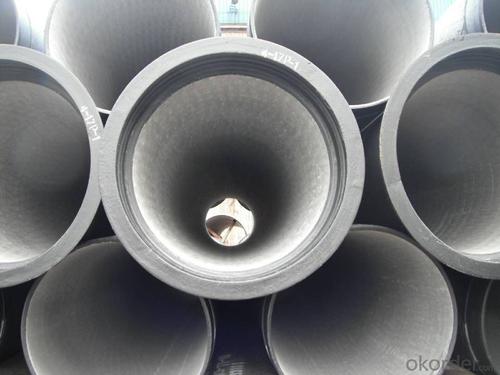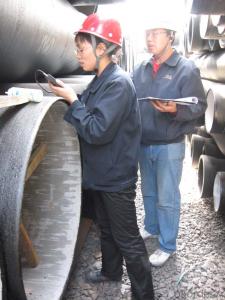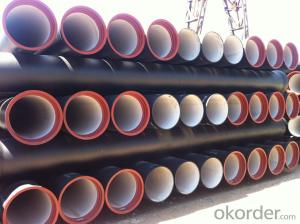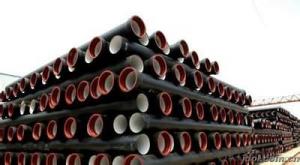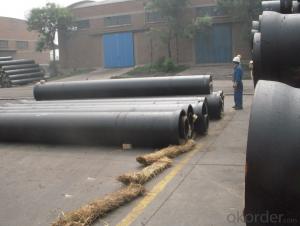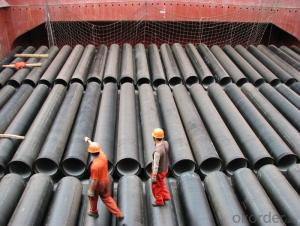DUCTILE IRON PIPE DN80 K9
- Loading Port:
- China Main Port
- Payment Terms:
- TT OR LC
- Min Order Qty:
- -
- Supply Capability:
- -
OKorder Service Pledge
OKorder Financial Service
You Might Also Like
Specification:
1) The standard of pipe: ISO2531:1998, K9
2) Effective length: 6m
3) Inner cement line: Portland cement line as per ISO4179
4) Zinc coating: at least 130g/m2 as per ISO8179
5) Bitumen painting: at least 70um as per ISO8179
6) With 100% quantity of NBR ring, or SBR ring, or EPDM ring as per ISO4633
7) DN80mm-800mm
8) High strength, lighter than grey iron, good corrosion resistance, no furring, small flow resistance, easy fixing, long life tome about 100 yeas
9) Produced by Hangzhou chunfeng machine
10) Checked by automatic inspection equipment
11) Composition:
Chemical composition | |||
Chemical composition | Ductile Cast Iron Pipe (%) | Grey iron pipe (%) | Steel pipe (%) |
C | 3.5-4.0 | 3.2-3.8 | 0.1-0.2 |
Si | 1.9-2.6 | 1.4-2.2 | 0.15-0.4 |
Mn | 0.15-0.45 | 0.4-0.6 | 0.3-0.6 |
P | ≤0.06 | ≤0.3 | 0.02-0.03 |
S | ≤0.02 | ≤0.1 | 0.02-0.03 |
Mg | 0.03-0.06 |
|
|
12) Feature:
Mechanical properties | |||
| Ductile Cast Iron Pipe | Grey Iron Pipe | Steel Pipe |
Tensile Strength(Mpa) | ≥420 | 150-260 | ≥400 |
Yield Strength(Mpa) | ≥300 | No Confirmation | No Confirmation |
Bending Strength(Mpa) | ≥590 | 200-360 | ≥400 |
Elongation (%) | ≥10 | Neglected | ≥18 |
Brinell Hardness(HBS) | ≤230 | ≤230 | About 140 |
13) T type mechanical joint
14) Packing: in bulk or container
- Q: Are ductile iron pipes prone to external corrosion?
- Ductile iron pipes are generally not prone to external corrosion. This is due to the protective nature of the material itself. Ductile iron pipes are made of a strong and durable material that contains a significant amount of graphite. The graphite acts as a natural barrier against external corrosion, preventing the pipe from being affected by rust or other forms of oxidation. Additionally, ductile iron pipes are often coated with a protective layer, such as cement mortar or polyethylene, to further enhance their resistance to corrosion. These coatings provide an extra layer of protection, preventing any contact between the pipe and corrosive substances in the environment. However, it should be noted that while ductile iron pipes are generally resistant to external corrosion, they may still be susceptible to localized corrosion in certain conditions. Factors such as soil composition, moisture content, and the presence of certain chemicals can potentially lead to the corrosion of ductile iron pipes in specific areas. Therefore, proper maintenance and regular inspections are necessary to identify and address any potential corrosion issues promptly. Overall, ductile iron pipes are considered to be highly resistant to external corrosion, but like any other material, they require proper care and maintenance to ensure their long-term durability and reliability.
- Q: Can ductile iron pipes be used for underground fire hydrant systems?
- Yes, ductile iron pipes can be used for underground fire hydrant systems. Ductile iron pipes are known for their strength, durability, and resistance to corrosion, making them a suitable choice for underground installations. They can withstand the high pressure and flow rates required for fire hydrant systems, ensuring reliable water supply for firefighting purposes.
- Q: How does ductile iron pipe perform in areas with high soil acidity?
- Due to its innate corrosion resistance, ductile iron pipe is highly effective in areas with high soil acidity. It is specifically engineered to endure harsh environments and incorporates a safeguarding lining that shields against damage caused by acidic soil. This lining functions as a barrier, safeguarding the pipe from corrosion induced by the acid in the soil. Moreover, ductile iron pipe exhibits exceptional resistance to external loads, making it well-suited for regions with unstable soil conditions. In conclusion, ductile iron pipe is a dependable option for areas with high soil acidity, as it can withstand corrosive effects and offer enduring performance.
- Q: How do ductile iron pipes perform in cold weather conditions?
- The exceptional performance of ductile iron pipes in cold weather conditions is well-known. Unlike cast iron or PVC, ductile iron exhibits remarkable resistance to low temperatures. This resistance is primarily attributed to its unique microstructure, which enables it to maintain its structural integrity even in extreme weather conditions. In freezing temperatures, ductile iron pipes demonstrate a low coefficient of thermal expansion, meaning they do not contract or expand significantly with changes in temperature. This characteristic ensures their stability and prevents cracking or bursting. Additionally, the high impact resistance of ductile iron further enhances its ability to withstand the stress imposed by cold weather conditions. Moreover, ductile iron pipes are equipped with a protective lining, typically composed of cement mortar or epoxy. This lining acts as an additional barrier against the effects of cold weather, preventing the formation of ice on the inner surface of the pipes. Consequently, the risk of blockages or reduced flow capacity is greatly reduced. In conclusion, ductile iron pipes are a reliable choice for cold weather conditions. Their durability, low thermal expansion, and protective lining make them highly resistant to the challenges posed by freezing temperatures. Whether used for water supply, sewer systems, or other applications, ductile iron pipes have consistently proven their effectiveness even in the harshest winter climates.
- Q: Are ductile iron pipes suitable for use in irrigation sprinkler systems?
- Yes, ductile iron pipes are suitable for use in irrigation sprinkler systems. Ductile iron pipes are known for their durability, strength, and corrosion resistance, making them an ideal choice for various applications, including irrigation systems. These pipes have a high tensile strength and can withstand high pressure and heavy loads, which is essential for maintaining a consistent water supply to sprinkler systems. Additionally, ductile iron pipes have a long lifespan, reducing the need for frequent maintenance and replacement, making them a cost-effective option for irrigation systems. Overall, ductile iron pipes are a reliable and suitable choice for use in irrigation sprinkler systems.
- Q: Are ductile iron pipes suitable for use in mining applications?
- Ductile iron pipes are well-suited for mining applications due to their unique properties. Also known as nodular cast iron, ductile iron is a type of iron that has been modified with magnesium or cerium to enhance its microstructure, resulting in increased strength and flexibility compared to traditional cast iron. These enhancements make ductile iron pipes highly resistant to impact, corrosion, and abrasion, which are common challenges in mining environments. In mining applications, ductile iron pipes find multiple uses, including water supply, slurry transportation, and ventilation systems. Their exceptional durability and resistance to wear and tear make them ideal for handling abrasive materials, chemicals, and high-pressure fluids typically encountered in mining operations. Moreover, the ability of ductile iron pipes to withstand heavy loads and external pressures makes them suitable for underground mining, where they may need to support the weight of overlying rock layers. With their high tensile strength and flexibility, ductile iron pipes help prevent pipe failure and reduce the risk of leaks or breaks, ensuring the safety and efficiency of mining operations. Furthermore, ductile iron pipes are relatively simple to install, maintain, and repair. They can be welded or joined using mechanical couplings, allowing for quick and efficient installation at mining sites. Their corrosion resistance also minimizes the need for frequent maintenance and replacement, resulting in cost savings for mining companies. Overall, the superior mechanical properties and durability of ductile iron pipes make them a reliable and practical choice for mining applications.
- Q: Are ductile iron pipes suitable for hydroelectric power plants?
- Indeed, hydroelectric power plants can benefit from the suitability of ductile iron pipes. Renowned for their robustness, endurance, and adaptability, ductile iron pipes prove to be an optimal selection for a variety of water industry applications, including hydroelectric power plants. These pipes exhibit the ability to endure substantial pressure and resist corrosion, thereby ensuring their appropriateness for the conveyance of water throughout the various stages of hydroelectric power generation. Moreover, the extended lifespan of ductile iron pipes and their minimal maintenance requirements effectively reduce the overall operational expenses associated with power plant maintenance. Consequently, ductile iron pipes emerge as a dependable and fitting choice for hydroelectric power plants.
- Q: How do ductile iron pipes handle ground settlement near construction foundations?
- Ductile iron pipes are renowned for their effectiveness in handling ground settlement near construction foundations. Their flexible nature enables them to withstand ground movement without suffering severe damage or failure. When the ground settles near construction foundations, it exerts pressure on the surrounding infrastructure, potentially causing shifts in the soil. Ductile iron pipes have the advantage of absorbing and distributing this pressure, minimizing the risk of pipe breakage or deformation. A significant factor contributing to the resilience of ductile iron pipes is their high tensile strength. This strength enables the pipes to maintain their structural integrity even under substantial external forces. Consequently, they can endure ground settlement without experiencing fractures or cracks. Moreover, ductile iron pipes possess a high level of flexibility. This flexibility allows them to adapt to minor ground movements and accommodate shifts in the soil without compromising their functionality. The pipes can bend slightly without breaking or causing leaks, ensuring a continuous flow of fluids and preventing disruptions to the construction project. Additionally, ductile iron pipes are commonly installed with appropriate bedding and backfill materials. This ensures that the pipes have a stable and secure foundation, minimizing the risk of movement and settlement. The use of these materials also helps distribute the load exerted on the pipes more evenly, further enhancing their ability to handle ground settlement. All in all, ductile iron pipes are an excellent choice for construction projects that involve concerns about ground settlement. Their strength, flexibility, and proper installation techniques allow them to effectively handle ground movement near construction foundations, resulting in reliable and long-lasting infrastructure.
- Q: How do ductile iron pipes perform in high-traffic areas?
- Due to their inherent strength and durability, ductile iron pipes exhibit exceptional performance in high-traffic areas. The composition of these pipes includes graphite nodules, which impart them with their characteristic ductility. This ductility enables the pipes to flex and endure heavy loads and vibrations caused by traffic without experiencing any cracks or breaks. In areas with high traffic, where the ground is constantly in motion and subjected to heavy vehicle loads, ductile iron pipes demonstrate superior resistance to stress and impact. Their capacity to absorb and distribute the pressure from traffic ensures that these pipes maintain their structural integrity over time. This aspect is particularly significant since any damage or failure in a pipe system can lead to expensive repairs and disruptions in the water supply. Moreover, ductile iron pipes possess a high level of resistance to corrosion, making them suitable for installation in high-traffic areas exposed to diverse environmental conditions. Typically, these pipes are lined with a protective layer, such as cement mortar or epoxy, which provides an additional barrier against external factors. This resistance to corrosion guarantees the longevity of the pipes and reduces the need for frequent maintenance or replacement. Furthermore, ductile iron pipes exhibit excellent flow characteristics, enabling efficient water distribution even in areas with high traffic demands. The smooth interior surface of these pipes minimizes friction and pressure losses, ensuring a consistent and reliable water supply to meet the needs of the surrounding population. In conclusion, ductile iron pipes are a reliable and robust choice for high-traffic areas. Their strength, durability, resistance to corrosion, and efficient flow characteristics make them well-suited to withstand the demands and challenges posed by heavy traffic. They guarantee the continuous supply of water without compromising the structural integrity of the pipe system.
- Q: Can ductile iron pipes be used for gravity sewer systems?
- Yes, ductile iron pipes can be used for gravity sewer systems. Ductile iron pipes have the necessary strength, durability, and corrosion resistance to handle the flow of wastewater and withstand the external loads of a gravity sewer system. They are commonly used in underground applications where the pipes are laid in a trench and rely on gravity to transport the sewage.
Send your message to us
DUCTILE IRON PIPE DN80 K9
- Loading Port:
- China Main Port
- Payment Terms:
- TT OR LC
- Min Order Qty:
- -
- Supply Capability:
- -
OKorder Service Pledge
OKorder Financial Service
Similar products
Hot products
Hot Searches
Related keywords




